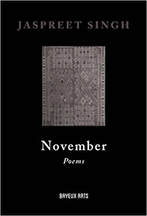A brief “Introductory Note” by J. Mark Smith provides an explanatory framework for the poems in Jaspreet Singh’s first collection of verse, November: “November (1984) was the month of mass murder of Sikhs across India. The genocidal violence was orchestrated by high-ranking officials of the Congress Party. Nearly three decades later, Jaspreet Singh’s mother, a survivor of that chaotic time, died. The haunting poems of November take their bearings from these two poles of loss.” Smith’s prefatory note functions as a crucial navigational aid for readers embarking on the journey into Singh’s poems, many of which take as their basis historical events related to India and the Sikh diaspora in Canada. The foreword enables readers to appreciate the temporal resonance and allusiveness of poems such as “This November, I try to Awaken Ghalib.” Sub-headed “—32 years on—” this central poem summons the Indian poet Ghalib to “teach us how to stand/ on the debris of the uncremated” and “how to tell this un-finished story to children.” Some poems of such historical cast evoke events with which Canadian readers should be familiar. The Canadian government’s infamous rejection of 376 eligible Sikh immigrants on board the Komagata Maru, remembered today as a flashpoint in the politics of racist exclusion and anti-Asian immigration policy in the early 20th century, is an episode evoked in several of Singh’s poems, for instance. Still, I suspect the collection’s “Introductory Note” came as a result of a reader who, like me, found herself at times wishing for more guidance on some of the poems’ less obvious reference points.
Yet November is a collection that deserves to be experienced—to be dwelt in. While Singh is perhaps better known for his previous fiction and nonfiction writing, his poetry is particularly compelling in its exploration of the otherness of language and of death. In poems such as “Punjabi,” language and personal loss converge in remarkable ways. “While in the old world it is dying,/ Punjabi blossoms in Canada,” where languages such as “English, Spanish and Mandarin/ French, Nootka and Chipewyan” intermix, and “the yellow cabs in cities/ are fleets/ of language laboratories.” But it is to a powerful realization of the poet’s grief for his dead mother that this meditation on the ancient “Punjabi” tongue builds in the end: “You are/ where my mother lives now.” The strongest works in this collection are those that—like the delightful “Insomnia”—see the poet conducting gleeful experiments with language. Written by an author who dwells “in five languages…, yet outside the national song,” November offers readers a unique, nimble new voice and perspective in poetry.
Yet November is a collection that deserves to be experienced—to be dwelt in. While Singh is perhaps better known for his previous fiction and nonfiction writing, his poetry is particularly compelling in its exploration of the otherness of language and of death. In poems such as “Punjabi,” language and personal loss converge in remarkable ways. “While in the old world it is dying,/ Punjabi blossoms in Canada,” where languages such as “English, Spanish and Mandarin/ French, Nootka and Chipewyan” intermix, and “the yellow cabs in cities/ are fleets/ of language laboratories.” But it is to a powerful realization of the poet’s grief for his dead mother that this meditation on the ancient “Punjabi” tongue builds in the end: “You are/ where my mother lives now.” The strongest works in this collection are those that—like the delightful “Insomnia”—see the poet conducting gleeful experiments with language. Written by an author who dwells “in five languages…, yet outside the national song,” November offers readers a unique, nimble new voice and perspective in poetry.
The Reviewer:
Christine Wiesenthal is a Professor at the University of Alberta.
Christine Wiesenthal is a Professor at the University of Alberta.





